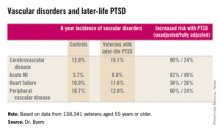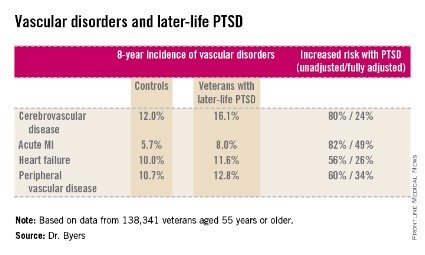User login
ORLANDO – Military veterans aged 55 years or older with current posttraumatic stress disorder are at significantly higher risk of developing new-onset vascular disease than those without PTSD, according to a very large national longitudinal study.
"This study suggests the need for greater monitoring and treatment of PTSD in older veterans to assist in the prevention of vascular disorders over the long term," Amy L. Byers, Ph.D., asserted at the annual meeting of the American Association for Geriatric Psychiatry.
She reported on 138,341 veterans aged 55 years or older, all of whom were free of known vascular disease at baseline. During 8 years of follow-up, the subjects with PTSD had significantly higher rates of incident cerebrovascular disease, acute myocardial infarction, heart failure, and peripheral vascular disease than those without a current diagnosis of PTSD.
This remained the case even after controlling for numerous potential confounders in multivariate analysis, including demographics and comorbid diabetes, hypertension, cancer, chronic obstructive pulmonary disease, renal disease, traumatic brain injury, dementia, substance use disorders, and psychiatric diagnoses. The fully adjusted increased risk of each of the forms of vascular disease under study still remained significant at the P less than .001 level, noted Dr. Byers, an epidemiologist in the psychiatry department at the University of California, San Francisco.
These findings are neither generalizable to veterans under age 55 with PTSD nor generalizable to civilians, she said. But a separate, newly published study in which Dr. Byers was the lead author did show that PTSD in the general population with onset prior to age 55 and persistence beyond age 55 is a powerful independent predictor of global disability.
Dr. Byers’ study of older veterans was funded by the Department of Defense. She reported having no financial conflicts.
ORLANDO – Military veterans aged 55 years or older with current posttraumatic stress disorder are at significantly higher risk of developing new-onset vascular disease than those without PTSD, according to a very large national longitudinal study.
"This study suggests the need for greater monitoring and treatment of PTSD in older veterans to assist in the prevention of vascular disorders over the long term," Amy L. Byers, Ph.D., asserted at the annual meeting of the American Association for Geriatric Psychiatry.
She reported on 138,341 veterans aged 55 years or older, all of whom were free of known vascular disease at baseline. During 8 years of follow-up, the subjects with PTSD had significantly higher rates of incident cerebrovascular disease, acute myocardial infarction, heart failure, and peripheral vascular disease than those without a current diagnosis of PTSD.
This remained the case even after controlling for numerous potential confounders in multivariate analysis, including demographics and comorbid diabetes, hypertension, cancer, chronic obstructive pulmonary disease, renal disease, traumatic brain injury, dementia, substance use disorders, and psychiatric diagnoses. The fully adjusted increased risk of each of the forms of vascular disease under study still remained significant at the P less than .001 level, noted Dr. Byers, an epidemiologist in the psychiatry department at the University of California, San Francisco.
These findings are neither generalizable to veterans under age 55 with PTSD nor generalizable to civilians, she said. But a separate, newly published study in which Dr. Byers was the lead author did show that PTSD in the general population with onset prior to age 55 and persistence beyond age 55 is a powerful independent predictor of global disability.
Dr. Byers’ study of older veterans was funded by the Department of Defense. She reported having no financial conflicts.
ORLANDO – Military veterans aged 55 years or older with current posttraumatic stress disorder are at significantly higher risk of developing new-onset vascular disease than those without PTSD, according to a very large national longitudinal study.
"This study suggests the need for greater monitoring and treatment of PTSD in older veterans to assist in the prevention of vascular disorders over the long term," Amy L. Byers, Ph.D., asserted at the annual meeting of the American Association for Geriatric Psychiatry.
She reported on 138,341 veterans aged 55 years or older, all of whom were free of known vascular disease at baseline. During 8 years of follow-up, the subjects with PTSD had significantly higher rates of incident cerebrovascular disease, acute myocardial infarction, heart failure, and peripheral vascular disease than those without a current diagnosis of PTSD.
This remained the case even after controlling for numerous potential confounders in multivariate analysis, including demographics and comorbid diabetes, hypertension, cancer, chronic obstructive pulmonary disease, renal disease, traumatic brain injury, dementia, substance use disorders, and psychiatric diagnoses. The fully adjusted increased risk of each of the forms of vascular disease under study still remained significant at the P less than .001 level, noted Dr. Byers, an epidemiologist in the psychiatry department at the University of California, San Francisco.
These findings are neither generalizable to veterans under age 55 with PTSD nor generalizable to civilians, she said. But a separate, newly published study in which Dr. Byers was the lead author did show that PTSD in the general population with onset prior to age 55 and persistence beyond age 55 is a powerful independent predictor of global disability.
Dr. Byers’ study of older veterans was funded by the Department of Defense. She reported having no financial conflicts.
AT THE AAGP ANNUAL MEETING
Major finding: Military veterans with late-life posttraumatic stress disorder were 80% more likely to develop new-onset cerebrovascular disease during 8 years of follow-up than were those without PTSD. They were also 82% more likely to have a first acute myocardial infarction, 56% more likely to develop heart failure, and 60% more likely to be diagnosed with peripheral vascular disease.
Data source: This was a longitudinal observational study in 138,341 veterans aged 55 years or older who were free of known vascular disease at baseline and were followed for 8 years.
Disclosures: Dr. Byers’ study of older veterans was funded by the Department of Defense. She reported having no financial conflicts.

